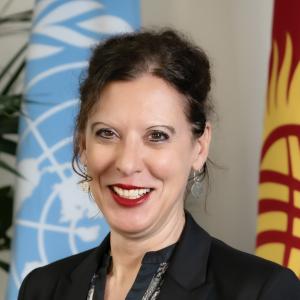Council Meeting on the Rights of Women, Children and Gender Equality
17 June 2025, 2 PM | Oval Hall, Jogorku Kenesh
Madam Deputy Speaker,
Honourable Members of Parliament,
Dear Colleagues and Participants,
It is a pleasure to join you today for this important session of the Council on the Rights of Women, Children and Gender Equality. Let me first extend my sincere congratulations to Madam Deputy Speaker Zhyldyz Sadyrbaeva on presiding over her first meeting as Chair of this Council. Your leadership is vital to advancing inclusive, rights-based policymaking and please be assured of the UN system’s support in your endeavors.
Today’s agenda—focusing on gender equality and inclusive education—touches some of the core of Kyrgyzstan’s sustainable development and commitments to achieve the Sustainable Development Goals. And both are not parallel tracks but they are mutually reinforcing. Ensuring that every child can access quality education, and that every woman can fully participate in public and economic life, strengthens both social justice and national resilience.
As we mark 100 years of the women’s movement in Kyrgyzstan, it is an opportune moment to reflect on progress towards gender equality. Recent steps—such as the adoption of amendments to strengthen the Law on Protection and Defense against Domestic Violence and the ratification of ILO Convention No. 190—bring national legislation in line with international commitments. These measures reflect a broader effort to address gender-based violence and harassment and are particularly timely as we observe the 30th anniversary of the Beijing Declaration and Platform for Action—but it also underscores the need for full implementation, backed by adequate resources and accountability.
We are also pleased to support Parliament in the implementation of its Action Plan on Promoting Gender Equality, which sets out concrete measures to strengthen women’s representation, integrate gender analysis into legislation, and expand gender-responsive budgeting across sectors. We look forward to hearing updates on implementation progress during today’s session.
Parliament’s leadership will also be detrimental in closing persistent gender and economic gaps. Women’s labor force participation remains at about 53%. Limited access to childcare, disproportionate unpaid care burdens, and barriers to entrepreneurship continue to limit women’s economic agency. We encourage this Council to consider hearings or committee briefings on the care economy, and to explore fiscal measures that directly support women’s participation in the workforce.
These gender and economic gaps have long-term consequences—particularly for children. Although, according to recent data, national poverty fell to 25.7% in 2024, child poverty remains high at 33.1%, affecting nearly one million children. Rural children and children with disabilities face the most severe disadvantages, with overlapping barriers to education, nutrition, and care. Addressing these issues requires coordinated policy action, not just one-off programs, which is why I am particularly happy that today’s session is dedicated to this topic.
That’s why Parliament’s support for increasing school meal funding in 2024 was so important. School meals are a proven investment in both education and child welfare. We encourage regular budget indexing toward a target of KGS 30–35 per child per day. This is a practical, cost-effective way to improve nutrition and learning outcomes while easing the burden on low-income families.
But access to food in schools is only part of the story. As noted by the UN Special Rapporteur on the rights of persons with disabilities following her official visit to Kyrgyzstan in autumn 2024, inclusive education remains a major implementation gap. Despite legal protections, many children with disabilities are excluded from mainstream schooling due to inaccessible infrastructure, lack of trained teachers and limited assistive technologies. The Special Rapporteur further stressed the need to move from a charity-based to a rights-based approach—one backed by individualized support, sufficient funding, and clear accountability.
To partly address this, the UN system is supporting the Altyn Kazyk education reform roadmap, focused on competency-based curricula, inclusive standards, and early childhood development. We are also working to expand teacher training in inclusive methods, extend home-based preschools, and improve access to adapted learning materials. Finally, we have a joint program where expertise and capacities of UNDP, UNICEF, and UNFPA are coming together to support Kyrgyzstan’s initiatives to advance the rights of persons and children with disabilities in this regard.
Yet, these efforts must be complemented by strong parliamentary engagement: through revisions to the Law on Education, budget allocations for inclusion, and oversight mechanisms that ensure progress is monitored and sustained.
Dear Participants,
This year, Kyrgyzstan will present its second Voluntary National Review of SDG progress at the UN High-Level Political Forum that will take place in New York in July this year. This is an opportunity to showcase progress on the SDGs and highlight how Parliament is contributing to SDG implementation, and I am particularly pleased that a Member of Parliament will be part of the official Kyrgyz delegation. From gender equality to inclusive education, this Council has a key role to play in demonstrating accountability and ambition on the global stage and most importantly support the implementation of the recommendations that will come out of the second Voluntary National Review.
In conclusion, let me again reassure you of the support in these endeavors of Parliament, the Government, civil society, and all other relevant partners — including the United Nations family in Kyrgyzstan with its 27 agencies, funds, and programs — in these important endeavors.
Thank you.
Speech by


